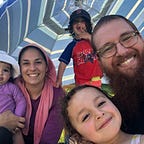Projection is Not Protection
How my son’s surgery churned a crucial lesson in parenting — Our children are extensions of ourselves, however, they are indeed their own selves
It’s been a whirlwind. Last Tuesday my son had one of the most routine procedures in this country, yet it’s totally thrown me off my rocker. This is my reflection.
The surgery went well, thank Gd, but the whole experience has triggered emotions of fear, trauma (I use this term loosely here), helplessness, guilt, and probably others I’m not mentioning. I was fully invested in his experience… probably a little too invested.
Motherly instinct intact, I was prepared to try my absolute hardest to protect him and take away all of his pain. He woke up from surgery, and we unexpectedly needed to stay the night because they wanted to monitor his oxygen levels. That was a shock, but I kept reminding myself (as I heard the boy we shared a room with’s doctors telling him how his sickle cell anemia may complicate his tonsil surgery) that we had it good and that our stay was only precautionary.
With each of my children, I live with the notion that their joy is my joy and their pain is my pain. It’s the beauty (and challenge) of being a parent. But throughout this experience, I’ve learned that sharing their joys and pains is different than engulfing myself in them. ‘Sharing’ represents togetherness, love, and support, while ‘engulfing’ represents feelings of helplessness and a lack of boundaries.
Setting healthy boundaries and ‘taking a step back’ are what I find to be the hardest parts of being a mother.
When your toddler falls, what’s your first instinct? Pick ‘em up, wipe the dirt off their pants, and tell them not to climb on that ledge again! We want to control their every move because they are our prized possessions and the last thing we want is for them to be scared, in pain, embarrassed, troubled, etc. It stems from love and makes so much sense. It’s how many of us are wired. What we don’t realize, however, is that this way of thought actually drives so much of the pain we experience in our lives.
Instead of picking our children up after every fall, we need to give them the tools to pick themselves up.
Instead of always telling them how proud we are of them, we need to ask them how proud they are of themselves.
Instead of engulfing ourselves in their pain, we need to be a loving support system that empathizes, validates, and tells them they are not alone.
When we try to take away our children’s emotional pain, we aren’t allowing them to experience normal emotions that are there to protect them and help them cope with their own experiences. Being overbearing is counterproductive to our children’s well-being because they won't learn to cope with their own experiences in healthy ways.
So, why do we do this if it’s so unhealthy? So many of us don’t even realize we are doing it. We spend so much time trying to protect our children from normal emotions and experiences because they’ve triggered something in us as parents that we either haven’t dealt with or don’t want to face.
This realization came to me a few days ago when I spoke to a good friend about how my child must be traumatized by his experience. I convinced myself that he probably remembers them pinning him down before the anesthesia, and he must need therapy now.
My dear friend validated that while children are resilient, we should help them if they seem traumatized. But she also brought up an important point that I was overlooking: I may be projecting my own traumatic childhood experiences on him, my stress and anxiety preceding the surgery were because of my own negative medical childhood experiences — not his, and that my emotional distress after the surgery is also because of those negative experiences. I’ve engulfed myself so deeply in his experience, that I’ve perceived it as if it were my own — from my own childhood.
Gosh, this is so complicated. But it does make a bit of sense. I now recognize that it’s been difficult for me to allow him to experience this on his own terms without me interfering with my perception. What I need to do to truly support him is not agonize over his “traumatic experience”, but talk to him about it, see how he feels, allow him to honor his thoughts and feelings, and validate him.
As far as myself goes, I need to give myself time to process the events, find support in those who love me, and give myself a big, loving hug. Being a mom has its difficult moments, especially when it takes you back to those uncomfortable childhood memories. But we can normalize this and recognize the opportunity for growth.
Looking forward, I’m going to work on not projecting personal emotional triggers and trauma onto my children and let them have their own, untainted experiences. I’m going to face my own issues independently of my children, and be there to support them through theirs.
This will allow me to be the best mom I can be, it will encourage me to set healthy boundaries, and it will set a good example for my children to do the same. It’s not going to be easy, and it will probably take internal emotional work and healing, but it can only catalyze positive growth and an emotionally healthy future for my family.
